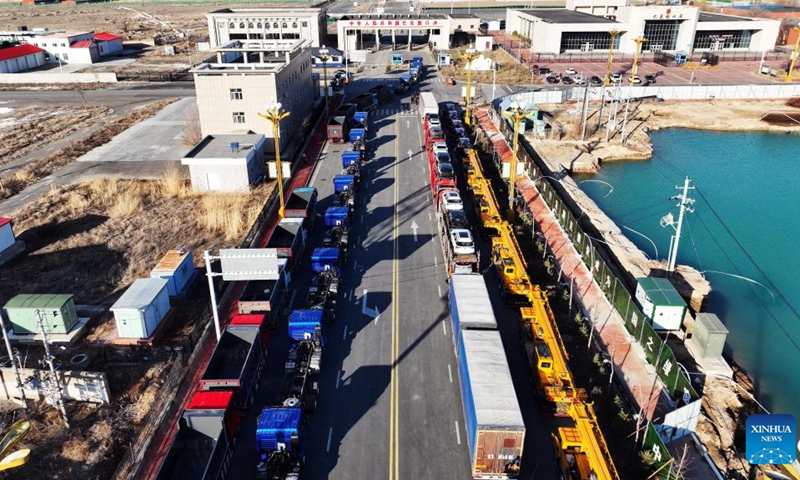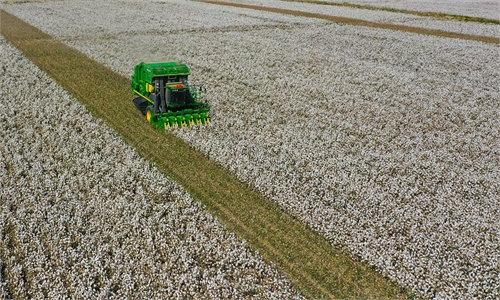
This aerial photo taken on March 29, 2023 shows inbound and outbound vehicles at the Bakti port in Tacheng, northwest China's Xinjiang Uygur Autonomous Region. Located on the border of China and Kazakhstan, the exit and entry frontier inspection station of Bakti port has optimized clearance measures to improve the transportation efficiency since this year.(Photo: Xinhua)
Nearly one year after the US enacted an act to ban all products from China's Xinjiang region due to the baseless forced labor allegation, some US politicians are hyping enforcement action and public scrutiny of American companies who seek to "skirt" the act. Analysts said the act has failed to force decoupling with China and has severely impacted international trade.
US companies will be under scrutiny for "profiteering" from "forced labor," Chris Smith, chairman of the Congressional-Executive Commission on China (CECC), said during the first congressional hearing on the implementation of the US Uyghur Forced Labor Prevention Act (UFLPA) on Tuesday.
The CEEC hearing came after US media reports said that the US Customs and Border Protection (CPB) has seized over $961 million worth of goods sourced from or produced in China's Xinjiang region since last June under the US' "forced labor law."
The Chinese authorities and regional government in the Xinjiang region have reiterated opposition to the UFLPA, which took effect in June 2022, and pointed out the forced labor allegation is groundless. Analysts and companies - both American and transnational corporations - have also criticized the bill for severely damaging the global supply chain and poisoning the international business environment.
"The US is chasing a ghost," Wang Jiang, an expert at the Institute of China's Borderland Studies at Zhejiang Normal University, told the Global Times on Wednesday, as it has failed to find one case to prove the forced labor allegation. The so-called forced labor bill has been used to prosecute companies under the excuse of "human rights," Wang said.
With the implementation of the act, American companies and customers have had to pay the price for increased administrative costs, said Wang, noting that the act is also a form of protectionism, which violates the rules of fair trade and damages confidence in the US market.
The UFLPA has drawn controversy since the day it was introduced as it forced companies to undergo self-review to pull anything related to China's Xinjiang region out of their supply chains. Products from the region have become indispensable, especially in certain areas. For example, China produces 22 percent of the world's cotton, 84 percent of which comes from Xinjiang, so the act also hurts US apparel companies.
With the economic rebound and expansion of consumption in the post-COVID-19 era, the influence of the US act is becoming more limited, and it is the US that will suffer more, analysts said.
Wang noted that smearing Xinjiang has become a card to play for some American politicians, as part of a "race" to see who is more hawkish toward China, with some focusing on Xinjiang and others choosing TikTok.
As a member of the US House of Representatives from New Jersey's 4th district, Smith has been active in criticizing China's human rights situation and has reportedly chaired numerous congressional hearings on China's human rights.
Poisoning international competition and trade orders on the basis of human rights is the usual US tactic to attack other countries and will finally bankrupt its credit, said Wang.

